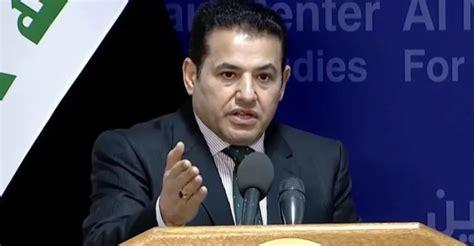
Iraq’s top security advisor: Dissolving PMF “impossible,” warns of ISIS threats
Iraqi National Security Advisor Qasim al-Araji dismissed calls to dissolve the Popular Mobilization Forces (PMF), deeming such proposals as “worthless” and “impossible.”
In an interview with Sky News Arabia, al-Araji emphasized the PMF’s role as a “vital national institution” approved by the Iraqi Parliament.
Highlighting Iraq’s security improvements despite years of challenges posed by terrorist organizations, he pointed out, “The security situation has now stabilized, although ISIS still tries to exploit gaps,” commending the vigilance of Iraqi forces in countering threats.
While downplaying ISIS’s current threat level, al-Araji explained that the group no longer controls territory or can declare a caliphate. “They are confined to caves, valleys, and rugged areas,” he said. “Our security forces are actively pursuing them to eliminate their presence entirely.”
Meanwhile addressing the situation in Syria’s al-Hol camp near the Iraqi border, where numerous ISIS families reside, al-Araji revealed that “Iraq has repatriated approximately 300 families – around 11,000 individuals – since 2021.”
He also confirmed the receipt of 2,800 ISIS detainees from the Syrian Democratic Forces (SDF), who are currently in the custody of the Iraqi Ministry of Interior and will face legal proceedings.
Regarding the withdrawal of the US-led Global Coalition, al-Araji expressed confidence in Iraq’s ability to maintain security independently. “Iraqi security forces, based on coalition assessments, are fully capable of ensuring stability without external assistance,” he stated.
While the last Coalition member is expected to depart Iraq by September 2026, al-Araji clarified that “the current discussions primarily focus on the Coalition’s withdrawal from Syria.”
Al-Araji underscored Iraq’s efforts to leverage its strong ties with both the United States and Iran to ease regional tensions. He emphasized the government’s commitment to disarming non-state actors and integrating armed groups into Iraq’s official security forces.
Notably, the Global Coalition to Defeat ISIS, established in 2014, played a pivotal role in supporting Iraq’s military efforts, which led to the territorial defeat of ISIS in 2017.
Over 30 nations contributed to the Coalition’s success by providing military support, training, and equipment.
In 2024, the US and Iraq outlined a phased plan to end the Coalition’s mission in Iraq by September 2025, while continuing counter-ISIS operations in Syria from Iraq until September 2026.
Source » shafaq.com





